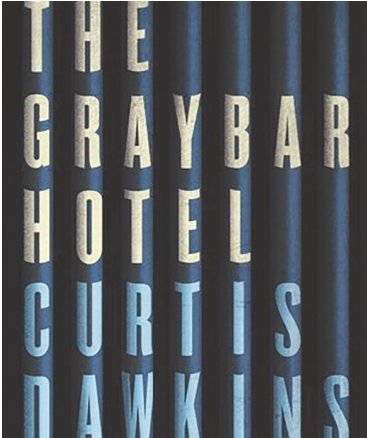Books behind barsMichigan inmate is successful author
Prison writing and tattoos have a lot in common. Both give us a look at the soul of a person we can’t experience in any other way. Both are seared with pain and often give us a glimpse of a culture we know nothing about.
Addict, convicted murderer and now published author Curtis Dawkins, 49, provides keen insight into an unknown world in his debut book, “The Graybar Hotel,” a collection of short fiction.
The book joins a long history of jailhouse writing, most notably, authors like O. Henry, Jack London, Malcolm X and Jack Henry Abbott.
The 14 short stories written over the last 12 years of incarceration let us into Dawkins’ world of locked cells, cheap mattresses, the yard and daydreaming cellmates.
I caught up with Dawkins by phone from the Lakeland Correctional Facility in Coldwater, to learn more about what led him to prison and what inspires him to write.
While talking, there was a sense of unspoken urgency since calls are limited to 16 minutes. A robo-operator alerts callers that calls are recorded, provides a number to call if the prisoner is harassing you and cuts in at 15 minutes, alerting you that you have one minute left.
Dawkins is an unusual prisoner. In 2000, he earned a master’s degree in fine arts from Western Michigan University, studying under National Book Award winner Jaimy Gordon and regional writer Stuart Dybek. In addition to being published, both his former teachers contributed to the book. In several of Dawkins’ stories, there are glimpses of George Saunders’ magical realism — elements of fantasy that are grounded in reality, such as in the story “573543,” Dawkins’ own prison identification number. The tale involves an inmate who relates how his cellmate, Pepper Pie, teaches himself to disappear, aided by a prisoner number that was formerly held by a dead man. I won’t ruin how Pepper Pie got his nickname, but it’s hilarious and indicative of the importance of a nickname in prison.
Dawkins said he doesn’t really have a jailhouse nickname.
“But my cellmate calls me ‘Orville’ because I like popcorn,” he said.
How a man nicknamed Orville ended up in prison for life is not something Dawkins likes to talk about, but he accepts responsibility for his actions. In 2004, he found himself in a Halloween gangster’s costume, wielding a .357 Smith & Wesson, a weapon he had bought to protect himself from the drug dealers he frequented.
His early life was characterized with alcohol addiction, but he cleaned up, and while studying at Western Michigan University he met his future partner. Kimberly Knutsen was a Ph.D. student with whom Dawkins had two children: Lily Rose and Elijah, joining Knutsen’s son, Henry.
But Dawkins’ idyllic reality soon succumbed to addiction again. After smoking crack, he went — there is no easy way to say it — crazy, becoming a murderer.
Although the situation was mind-numbing for Knutsen and the children, Dawkins said he still talks to them almost every day and is looking forward to an October visit.
Most publishers shy away from prison writing, so the circuitous way Dawkins’ manuscript was accepted is fascinating.
While in prison, Dawkins said he began writing, including doing book reviews for a literary magazine. The editor of that magazine, Jarrett Haley, then moved on to become editor of the San Diego State Alumni Magazine. While doing an interview with prestigious alum, now a literary agent, Dawkins convinced her to take a look at his manuscript. She did and, within weeks, it was sold to Scribner Publishing Group.
Dawkins spends most of his time in prison reading and writing. He is listening to audio tapes of “Moby Dick” and T.S.
Eliot reading ‘The Love Song of J. Alfred Prufrock and Others.’” He recently finished an advanced reading copy of a book by National Book Award winner Jesmyn Ward and predicts that “it will win a Pulitzer.”
He reads in an eclectic fashion and calls authors Denis Johnson, Tim O’Brien and Don DeLillo among his favorites, along with the poet Billy Collins.
But Dawkins isn’t resigned to publishing a single story. He said he has moved on to writing a futuristic novel about prison life, set in subterranean chambers where prisoners are put to sleep for the duration of their sentence.
Although he knows he will never get out of prison, he said “I’m really not here. I live mostly in my mind. I spend a lot of time in a fictional world.”
Dawkins is also creative in other ways.He contributes to the University of Michigan Prison Art Project.
In a recent review in “Oprah” magazine the esteemed novelist Joyce Carol Oates called Dawkins a “wickedly skilled storyteller.”
She may have understated his skills.
Support City Pulse - Donate Today!
Comments
No comments on this item Please log in to comment by clicking here